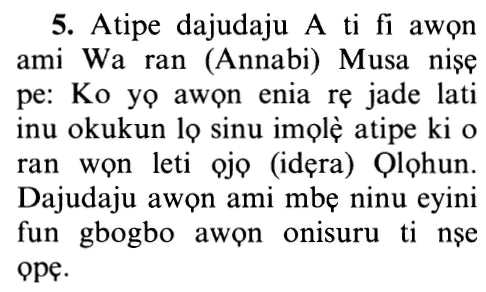14vs5
Select any filter and click on Go! to see results
وَلَقَدْ أَرْسَلْنَا مُوسَى بِآيَاتِنَا أَنْ أَخْرِجْ قَوْمَكَ مِنَ الظُّلُمَاتِ إِلَى النُّورِ وَذَكِّرْهُمْ بِأَيَّامِ اللّهِ إِنَّ فِي ذَلِكَ لآيَاتٍ لِّكُلِّ صَبَّارٍ شَكُورٍ
Walaqad arsalna moosa biayatina an akhrij qawmaka mina alththulumati ila alnnoori wathakkirhum biayyami Allahi inna fee thalika laayatin likulli sabbarin shakoorin
Index Terms
Click to play
Yoruba Translation

Hausa Translation
Kuma lalle ne haƙĩƙa Mun aika Mũsã game, da ãyõin Mu cħwa, "Ka fitar da mutãnenka daga duhu zuwa ga haske. Kuma ka tunar musu da kwãnukan (masĩfun) Allah." Lalle ne a cikin wancan akwai ãyõyi dõmin dukan mai yawan haƙuri, mai gõdiya.
Asbabu n-Nuzuul (Occasions of Revelation)
Story of Musa and His People
Allah says;
وَلَقَدْ أَرْسَلْنَا مُوسَى بِآيَاتِنَا ...
And indeed We sent Musa with Our Ayat (saying):
Allah says here, `Just as We sent you (O, Muhammad) and sent down to you the Book, in order that you might guide and call all people out of darkness into the light, We also sent Musa to the Children of Israel with Our Ayat (signs, or miracles).'
Mujahid said that this part of the Ayah refers to the nine miracles.
... أَنْ أَخْرِجْ قَوْمَكَ ...
Bring out your people,
he is being commanded;
...أَنْ أَخْرِجْ قَوْمَكَ مِنَ الظُّلُمَاتِ إِلَى النُّورِ ...
Bring out your people from darkness into light,
call them to all that is good and righteous, in order that they might turn away from the darkness of ignorance and misguidance they indulged in, to the light of guidance and the enlightenment of faith,
... وَذَكِّرْهُمْ بِأَيَّامِ اللّهِ ...
and remind them of the annals (or days) of Allah,
remind them (O Musa) of Allah's days, meaning, favors and bounties which He bestowed on them when He delivered them from the grip of Fir`awn and his injustice, tyranny and brutality. This is when Allah delivered them from their enemy, made a passage for them through the sea, shaded them with clouds, sent down manna and quails for them, and other favors and bounties.
Mujahid, Qatadah and several others said this.
Allah said next,
... إِنَّ فِي ذَلِكَ لآيَاتٍ لِّكُلِّ صَبَّارٍ شَكُورٍ ﴿٥﴾
Truly, therein are Ayat for every patient, thankful (person).
Allah says, `Our delivering of Our loyal supporters among the Children of Israel from the grasp of Fir`awn and saving them from the disgraceful torment, provides a lesson to draw from for those who are patient in the face of affliction, and thankful in times of prosperity.
Qatadah said,
"Excellent is the servant who if he is tested, he observes patience, and if he is granted prosperity, he is thankful for it.''
It is recorded in the Sahih that the Messenger of Allah said,
إِنَّ أَمْرَ الْمُؤْمِنِ كُلَّهُ عَجَبٌ، لَا يَقْضِي اللهُ لَهُ قَضَاءً إِلَّا كَانَ خَيْرًا لَهُ،
إِنْ أَصَابَتْهُ ضَرَّاءُ صَبَرَ، فَكَانَ خَيْرًا لَهُ،
وَإِنْ أَصَابَتْهُ سَرَّاءُ شَكَرَ، فَكَانَ خَيْرًا لَه
Verily, all of the matter of the believer is amazing, for every decision that Allah decrees for him is good for him.
If an affliction strikes him, he is patient and this is good for him;
if a bounty is give to him, he is thankful and this is good for him.
فيقول تعالى وكما أرسلناك يا محمد وأنزلنا عليك الكتاب لتخرج الناس كلهم تدعوهم إلى الخروج من الظلمات إلى النور كذلك أرسلنا موسى إلى بني إسرائيل بآياتنا قال مجاهد وهي التسع الآيات " أن أخرج قومك " أي أمرناه قائلين له " أخرج قومك من الظلمات إلى النور " أي ادعهم إلى الخير ليخرجوا من ظلمات ما كانوا فيه من الجهل والضلال إلى نور الهدى وبصيرة الإيمان " وذكرهم بأيام الله " أي بأياديه ونعمه عليهم في إخراجه إياهم من أسر فرعون وقهره وظلمه وغشمه وإنجائه إياهم من عدوهم وفلقه لهم البحر وتظليله إياهم بالغمام وإنزاله عليهم المن والسلوى إلى غير ذلك من النعم قال ذلك مجاهد وقتادة وغير واحد وقد ورد فيه الحديث المرفوع الذي رواه عبد الله بن الإمام أحمد بن حنبل في مسند أبيه حيث قال : حدثني يحيى بن عبد الله مولى بني هاشم حدثنا محمد بن أبان الجعفي عن أبي إسحاق عن سعيد بن جبير عن ابن عباس عن أبي بن كعب عن النبي صلى الله عليه وسلم في قوله تعالى " وذكرهم بأيام الله " قال " بنعم الله " ورواه ابن جرير وابن أبي حاتم من حديث محمد بن أبان به ورواه عبد الله ابنه أيضا موقوفا وهو شبه ; وقوله " إن في ذلك لآيات لكل صبار شكور" أي إن في ما صنعنا بأوليائنا بني إسرائيل حين أنقذناهم من يد فرعون وأنجيناهم مما كانوا فيه من العذاب المهين لعبرة لكل صبار أي في الضراء شكور أي في السراء كما قال قتادة : نعم العبد عبد إذا ابتلي صبر وإذا أعطي شكر وكذا جاء في الصحيح عن رسول الله صلى الله عليه وسلم أنه قال " إن أمر المؤمن كله عجب لا يقضي الله له قضاء إلا كان خيرا له إن أصابته ضراء صبر فكان خيرا له وإن أصابته سراء شكر فكان خيرا له " .
"ولقد أرسلنا موسى بآياتنا" التسع وقلنا له "أن أخرج قومك" بني إسرائيل "من الظلمات" الكفر "إلى النور" الإيمان "وذكرهم بأيام الله" بنعمه "إن في ذلك" التذكير "لآيات لكل صبار" على الطاعة "شكور" للنعم
أي بحجتنا وبراهيننا ; أي بالمعجزات الدالة على صدقه . قال مجاهد : هي التسع الآيات
I'raab - grammatical analysis of the Qur'an
«وَلَقَدْ أَرْسَلْنا» اللام واقعة في جواب القسم وقد حرف تحقيق وجملة القسم لا محل لها وأرسلنا ماض وفاعله والجملة مستأنفة.
«مُوسى » مفعول به منصوب بالفتحة المقدرة على الألف للتعذر.
«بِآياتِنا» متعلقان بأرسلنا ونا مضاف إليه.
«أَنْ أَخْرِجْ» أن مفسرة وفعل أمر فاعله مستتر.
«قَوْمَكَ» مفعول به والكاف مضاف إليه والجملة تفسيرية لا محل لها.
«مِنَ الظُّلُماتِ» متعلقان بأخرج.
«إِلَى النُّورِ» متعلقان بأخرج.
«وَذَكِّرْهُمْ» أمر فاعله مستتر والهاء مفعوله والجملة معطوفة.
«بِأَيَّامِ» متعلقان بذكرهم.
«اللَّهِ» لفظ الجلالة مضاف إليه.
«أَنْ» حرف مشبه بالفعل.
«فِي ذلِكَ» ذا اسم إشارة واللام للبعد والكاف للخطاب متعلقان بالخبر المقدم.
«لَآياتٍ» اللام المزحلقة وآيات اسم إن منصوب بالكسرة لأنه جمع مؤنث سالم والجملة تعليل لا محل لها.
«لِكُلِّ» متعلقان بصفة.
«صَبَّارٍ» مضاف إليه.
«شَكُورٍ» صفة.
